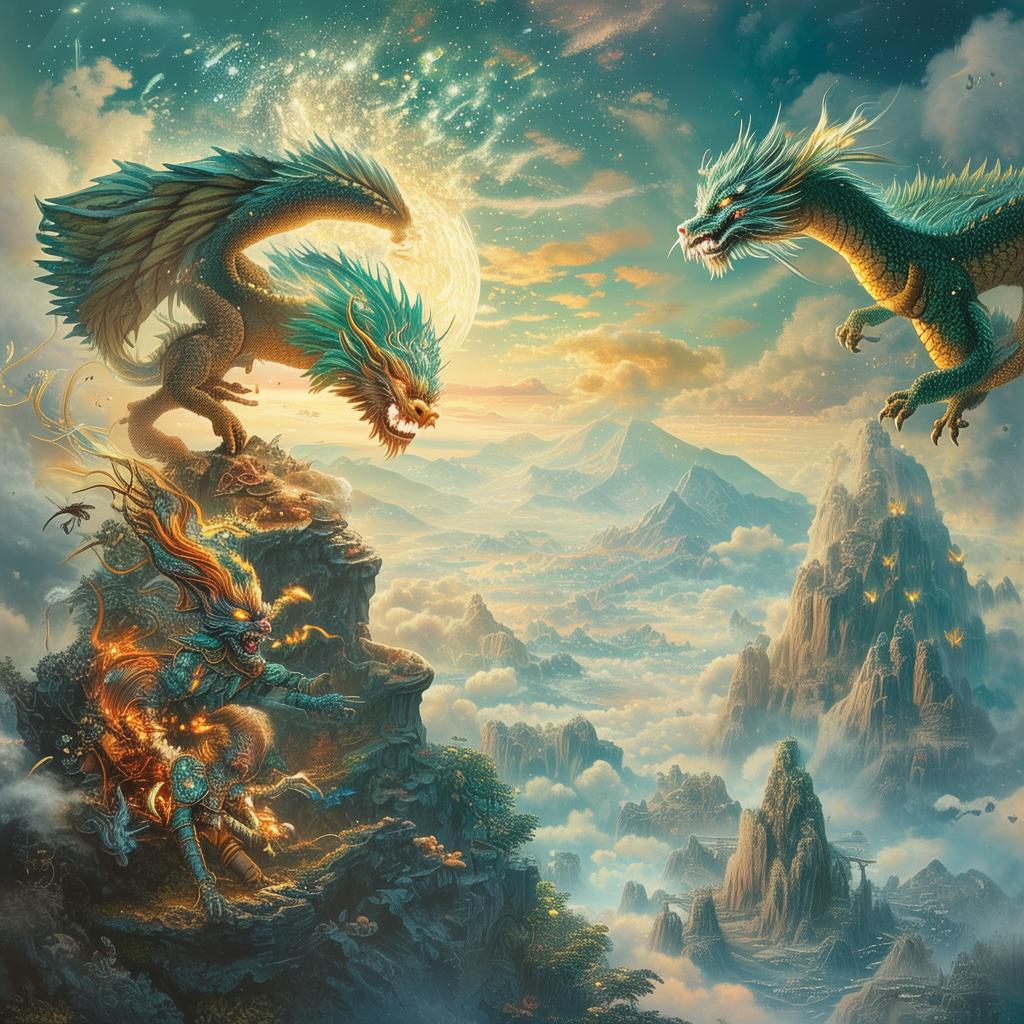The Elixir of the Ancestors: Mong Yi's Afterlife Odyssey
In the ancient land of the Divine Mong, nestled between the peaks of the highest mountains and the depths of the deepest rivers, there lay a secret so profound that it was whispered only in hushed tones. It was the tale of Mong Yi, a warrior whose name was as legendary as the mountains he had scaled and the rivers he had crossed. Mong Yi was not just a man; he was a guardian of the ancient ways, a bridge between the world of the living and the realm of the ancestors.
In the twilight of his days, Mong Yi received a vision—a vision that would change the course of his life and the fate of his people. The ancestors had spoken, and they had decreed that the Elixir of the Ancestors, a mystical potion that granted eternal life and the wisdom of the ages, had been lost in the afterlife. It was a quest that only Mong Yi could undertake, for he was the chosen one, the one who had the courage and the strength to face the trials that lay ahead.
The Elixir was not merely a potion; it was a symbol of the connection between the living and the departed. It was said that those who consumed it would be granted the ability to communicate with the spirits of their ancestors, to understand their wisdom, and to guide their descendants with the light of their ancient knowledge.
Mong Yi set out on his journey, his heart heavy with the weight of his destiny. He traveled through the land of the living, gathering the necessary ingredients for the elixir and learning the ancient chants that would protect him from the dangers that awaited him in the afterlife. His journey was fraught with peril, for the path to the afterlife was fraught with the spirits of the departed, each with their own tale and their own reason for remaining.
As he ventured deeper into the realm of the dead, Mong Yi encountered the first of many trials. The spirits of the ancestors, wise and ancient, tested his resolve. They appeared to him in the form of his own ancestors, each one presenting him with a riddle that would test his understanding of the ancient ways. Mong Yi, with his keen mind and unwavering spirit, solved each riddle, gaining the respect of the spirits and moving closer to his goal.

The second trial was a labyrinth of shadows, where the spirits of the departed wandered aimlessly, lost in their own sorrow and regret. Mong Yi, guided by the spirits of his ancestors, navigated the labyrinth, finding the path that led to the heart of the afterlife. He faced the spirits of the ancestors who had failed in their quests, their despair and regret a constant reminder of the dangers that lay ahead.
The third trial was a test of his physical strength and his will to survive. Mong Yi was confronted by the Great Serpent of the Afterlife, a creature that represented the power of the ancestors and the forces of nature. In a battle that raged for days, Mong Yi fought with all his might, using the ancient techniques he had learned to defeat the serpent. With each strike, he felt the power of the ancestors flowing through him, strengthening his resolve.
The final trial was a test of his heart and his soul. Mong Yi was taken to the Hall of Judgment, where the spirits of the ancestors would decide his fate. He was presented with a choice: to consume the Elixir of the Ancestors and gain eternal life, or to return to the world of the living and share the wisdom he had gained with his people. In a moment of profound clarity, Mong Yi chose to return to the world of the living, knowing that the true power of the elixir lay not in its ability to grant eternal life, but in its ability to share the wisdom of the ancestors.
With the Elixir of the Ancestors safely in his possession, Mong Yi returned to the world of the living. He shared the wisdom he had gained with his people, guiding them through the trials and tribulations that lay ahead. The Elixir of the Ancestors became a symbol of hope and unity, a reminder that the wisdom of the ancestors was a gift that could be passed down through the ages.
And so, Mong Yi's name was etched into the annals of history, not as a man who had sought eternal life, but as a guardian of the ancient ways, a bridge between the living and the departed, and a source of wisdom and guidance for generations to come.
✨ Original Statement ✨
All articles published on this website (including but not limited to text, images, videos, and other content) are original or authorized for reposting and are protected by relevant laws. Without the explicit written permission of this website, no individual or organization may copy, modify, repost, or use the content for commercial purposes.
If you need to quote or cooperate, please contact this site for authorization. We reserve the right to pursue legal responsibility for any unauthorized use.
Hereby declared.









